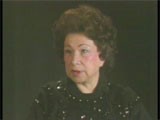You searched for: ������������������������������������������������cxfk69���pais
<< Previous | Displaying results 21-30 of 69 for "������������������������������������������������cxfk69���pais" | Next >>
-
Janusz Korczak
ArticleJanusz Korczak ran a Jewish orphanage in Warsaw. He and his staff stayed with the children even as German authorities deported them to their deaths at Treblinka in 1942.
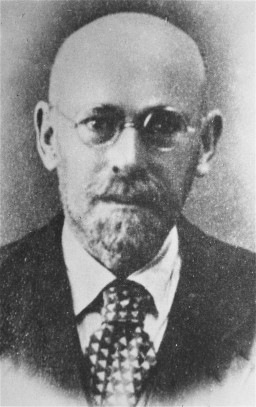
-
Letter Asking for Help to Hide Daughter
Timeline EventFebruary 1, 1943. On this date, Selek and Eda Kuenstler wrote to Sophia Zendler and begged her to hide their child.
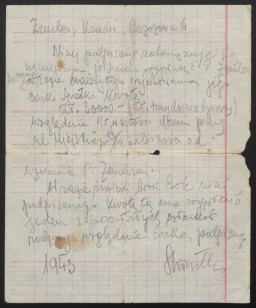
-
Max Gutmann
ID CardMax was raised in the Romanian town of Radauti, a trading and woodworking center near the Ukrainian border. The Gutmanns had a traditional Jewish home, and Max's father was on the board of directors of the local Jewish community. Max's father dealt in grain, feed, and livestock and he was a purveyor of horses for the Romanian military. 1933-39: Max's pony, Lisa, was kept in his family's stables with the other horses. The secondary school he attended was semi-private; it was governed by the state, but each…
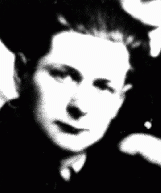
-
Elias (Elya) Grosmann
ID CardElias was born in a small town in the hill country of northeastern Slovakia. His family was Jewish, and he grew up in a religious home in which both Yiddish and Hungarian were spoken. His father was a peddler and his mother ran a small general store. Besides attending public schools, Elias received a formal Jewish education and attended Medzilaborce's rabbinical academy. 1933-39: The townspeople were mostly Jewish and worried about Nazi Germany. The German annexation of Austria in March 1938 alarmed them.…
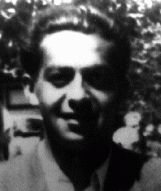
-
Yona Wygocka Dickmann
ID CardYona was the eldest of four children in a working-class Jewish family. The family lived in the Jewish section of Pabianice. Yona's father sold merchandise to Polish stores. When the Poles could not pay him for his goods, they would give him food for his family. It was a difficult life in Pabianice, but Yona's family was very close, and many relatives lived nearby. 1933-39: After war began in September 1939, the Germans set up a ghetto in Pabianice in Yona's neighborhood. Yona and all her extended family…
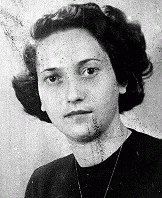
-
Jakab Katz
ID CardJakab, a religious Jew, was the father of eight children. In the early 1900s he sailed to America, paying his way by shoveling coal on the ship. In New York he earned enough money to help two of his daughters immigrate. Returning to Buj, he eventually moved his family to Zalkod, a small town in northeastern Hungary. There, helped by his wife, Terez, and his son, Miklos, he ran a store and a farm. 1933-39: Jakab's daughter, Sadie, and her two children, Lillian and Arthur, are visiting from America. The…
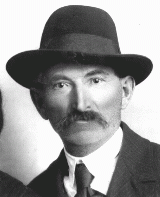
-
Leo Melamed describes train ride across the Soviet Union
Oral HistoryLeo was seven years old when Germany invaded Poland in September 1939. Before the war, Leo's father was a mathematics teacher and member of the Bialystok City Council. Fearing arrest, Leo's father fled Bialystok for Vilna just before the German occupation. Leo and his mother eventually joined his father in Vilna. After the Soviets occupied Vilna, Leo's father obtained transit visas to Japan. The family left Vilna in December 1940, traveled across the Soviet Union on the Trans-Siberian Express, and arrived…
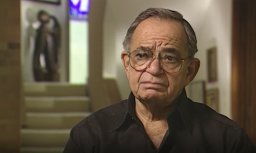
-
Thomas Buergenthal describes the significance of the Nuremberg trials to him both personally and as a lawyer and judge
Oral HistoryJudge Thomas Buergenthal was one of the youngest survivors of the Auschwitz and Sachsenhausen concentration camps. He immigrated to the United States at the age of 17. Judge Buergenthal devoted his life to international and human rights law. He served as chairman of the United States Holocaust Memorial Museum’s Committee on Conscience; was named the Lobingier Professor of Comparative Law and Jurisprudence at the George Washington University Law School; and served for a decade as the American judge at…
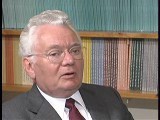
-
Charlene Schiff describes children smuggling food into the Horochow ghetto
Oral HistoryBoth of Charlene's parents were local Jewish community leaders, and the family was active in community life. Charlene's father was a professor of philosophy at the State University of Lvov. World War II began with the German invasion of Poland on September 1, 1939. Charlene's town was in the part of eastern Poland occupied by the Soviet Union under the German-Soviet Pact of August 1939. Under the Soviet occupation, the family remained in its home and Charlene's father continued to teach. The Germans…
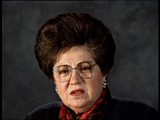
-
Guta Blass Weintraub describes Starachowice ghetto cultural life
Oral HistoryGuta and her family fled to Starachowice, Poland. There, the Germans ordered them and other Jews into a ghetto and put them to work in forced-labor factories. As an act of resistance at the Majowka camp, Guta attacked a Nazi guard preparing to shoot her and other prisoners at a mass grave. A bullet grazed her, but Guta pretended to be fatally wounded. Days later, Guta was deported to Auschwitz, then Ravensbrueck, where she was liberated. Her mother died only weeks short of freedom.
